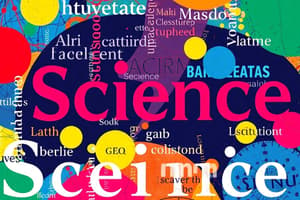Podcast
Questions and Answers
Why does science terminology become more difficult to understand as one studies scientific topics in greater detail?
Why does science terminology become more difficult to understand as one studies scientific topics in greater detail?
Science terminology becomes more difficult to understand as one studies scientific topics in greater detail because many scientific terms are rooted in different languages, such as Greek and Latin, making it harder for brain neurons to make new connections.
Give an example of a scientific term rooted in Latin.
Give an example of a scientific term rooted in Latin.
An example of a scientific term rooted in Latin is the scientific name for the average house cat, which is Felis catus.
Why is the Greek language used in scientific terminology?
Why is the Greek language used in scientific terminology?
The Greek language is used in scientific terminology because many of the pioneering scientists and researchers were Greek, which influenced the use of Greek words in scientific terms.
What are the three primary unique study styles mentioned in the text?
What are the three primary unique study styles mentioned in the text?
What is the definition of an auditory or verbal learner?
What is the definition of an auditory or verbal learner?
What is the definition of a visual learner?
What is the definition of a visual learner?
What is the definition of a hands-on learner?
What is the definition of a hands-on learner?
What are the three main word parts of a word?
What are the three main word parts of a word?
What does the term 'biology' mean?
What does the term 'biology' mean?
What is the definition of 'photosynthesis'?
What is the definition of 'photosynthesis'?
What are the three main word parts?
What are the three main word parts?
What is the definition of the term 'biology'?
What is the definition of the term 'biology'?
What is the definition of the term 'phagocytosis'?
What is the definition of the term 'phagocytosis'?
Flashcards are hidden until you start studying
Study Notes
Science Terminology Challenges
- Science vocabulary can be difficult to understand due to the use of Greek and Latin words, making it harder for brain neurons to make new connections.
- Many scientific terms are rooted in Greek and Latin, making it essential to understand the root, prefix, and suffixes of words to comprehend their meanings.
The Greek Alphabet and Taxonomy
- The Greek alphabet is used in science terminology due to the influence of pioneering Greek scientists and researchers.
- Latin was an international language during the time of scientific discovery in Europe, leading to the preservation of scientific terms in Greek and Latin.
Dissecting Science Vocabulary
- Scientific terms can be broken down into prefixes, roots, and suffixes to understand their meanings.
- Examples of Greek and Latin in science vocabulary include apoptosis, biology, and centrifugal.
- The word "apoptosis" can be dissected into its prefix "apo-" meaning "separating" and the root "-ptosis" meaning "falling off", which describes cellular death.
Common Science Terms
- Centrifugal: means the tendency to move away from the center of an object or entity.
- Biology: means the study of life or living organisms.
- Hydrocephalus: a medical condition where fluid is found in the brain.
- Photosynthesis: the process by which plants use sunlight and water to produce their own nutrients.
- Hydrogenation: the addition of hydrogen in a chemical reaction.
- Ornithology: the study of birds.
- Hypothesis: an educated explanation for a certain phenomenon.
- Ecology: the study of the ecosystem or environment.
- Heterotroph: an organism that relies on external sources of nutrients.
- Autotroph: an organism that makes its own nutrients via chemical processes.
Morphemes of Common Science Terms
- Morphemes are parts of words that cannot be broken down further and have a representative sound for a certain entity.
- Examples of morphemes include the root word "centri-" meaning "center" in centrifugal, and the suffix "-ology" meaning "study of" in biology.
Word Parts
- Roots: the base word for a new word, e.g. "sleep" in "sleeping".
- Prefixes: found at the beginning of a word, e.g. "un-" in "unhappy".
- Suffixes: found at the end of a word, e.g. "-ful" in "helpful".
Science: Root, Prefixes, and Suffixes
- Phagocytosis: an example of a term that consists of all word parts, including the prefix "phago-" meaning "to eat", the root "-cyt-" referring to a cell, and the suffix "-osis" referring to an abnormal condition.
Unique Study Styles
- Auditory or Verbal: learning best through hearing new information.
- Visual: learning best through seeing new information.
- Hands-on: learning best through performing tasks or physically touching objects.
Studying That Suits You
Use AI to generate personalized quizzes and flashcards to suit your learning preferences.




